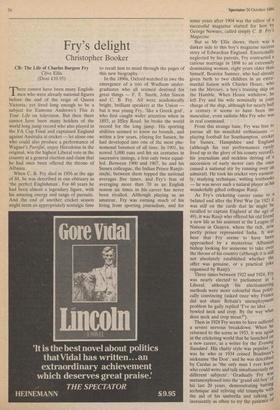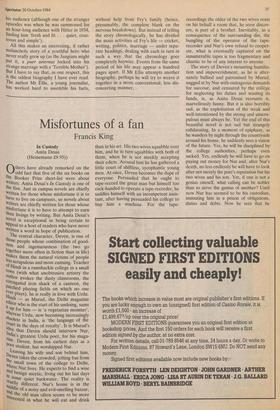Fry's delight
Christopher Booker
CB: The Life of Charles Burgess Fry Clive Ellis (Dent £10.95) rr here cannot have been many English- ", men who were already national figures before the end of the reign of Queen Victoria, yet lived long enough to be a subject for Eamonn Andrews's This Is Your Life on television. But then there cannot have been many holders of the world long jump record who also played in the FA Cup Final and captained England against Australia at cricket — let alone one who could also produce a performance of Wagner's Parsifal, enjoy Herodotus in the original, win the highest Liberal vote in the country at a general election and claim that he had once been offered the throne of Albania.
When C. B. Fry died in 1956 at the age of 84, he was described in one obituary as 'the perfect Englishman'. For 60 years he had been almost a legendary figure, with his amazing energy and range of pursuits. And the end of another cricket season might seem an appropriately nostalgic time to recall him to mind through the pages of this new biography.
In the 1890s, Oxford watched in awe the emergence of a trio of Wadham under- graduates who all seemed destined for great things — F. E. Smith, John Simon and C. B. Fry. All were academically bright, brilliant speakers at the Union but it was young Fry, 'like a Greek god', who first caught wider attention when in 1893, at Iffley Road, he broke the world record for the long jump. His sporting abilities seemed to know no bounds, and within a few years, playing for Sussex, he had developed into one of the most phe- nomenal batsmen of all time. In 1901, he scored 3,000 runs and hit six centuries in successive innings, a feat only twice equal- led. Between 1900 and 1907, he and his Sussex colleague, the Indian Prince Ranjit- sinjhi, between them topped the national averages five times, and Fry's feat of averaging more than 70 in an English season six times in his career has never been rivalled. Although playing as an amateur, Fry was earning much of his living from sporting journalism, and for some years after 1904 was the editor of a successful magazine started for him by George Newnes, called simply C. B. Fry's Magazine. But as Mr Ellis shows, there was a darker side to this boy's magazine success story of Edwardian England. Emotionally neglected by his parents, Fry contracted a curious marriage in 1898 to an extremely dominating woman, eight years older than himself, Beatrice Sumner, who had already given birth to two children in an extra- marital liaison with Charles Hoare, who ran the Mercury, a boy's training ship on the Hamble. When Hoare withdrew, he left Fry and his wife nominally in joint charge of the ship, although for nearly half a century it seems to have been the masculine, even sadistic Mrs Fry who was in real command.
From this strange base, Fry was free to pursue all his manifold enthusiasms playing football for Southampton, cricket for Sussex, Hampshire and England (although his test performances rarely lived up to the glory of his county record), his journalism and reckless driving of a succession of early motor cars (he once caused a national stir by running over an admiral). He took his cricket very earnest- ly, studying technique, writing textbooks — he was never such a natural player as Ids wonderfully gifted colleague Ranji.
As Fry's cricketing career came to a belated end after the First War (in 1921 it was still on the cards that he might be recalled to captain England at the age of 49), it was Ranji who offered his old friend a new life as his assistant at the League of Nations in Geneva, where the rich, now portly prince represented India. It was here that Fry seems to have been approached by a mysterious Albanian bishop looking for someone to take over the throne of his country (although it is still not absolutely established whether the offer was genuine, or a practical joke organised by Ranji). Three times between 1922 and 1924, Fry was nearly elected to parliament as a Liberal, although his electioneering methods were more colourful than politi- cally convincing (asked once why France did not share Britain's unemployment problem he gaily replied 'I've no idea • • • bowled neck and crop. By the way what does neck and crop mean?'). Then in 1928 Fry seems to have suffered a severe nervous breakdown. When he returned to the scene in 1933, it was again in the cricketing world that he launched on a new career, as a writer for the Evening Standard. His chatty style was popular, it was he who in 1934 coined Bradman s, nickname 'the Don', and he was described by Cardus as 'the only man I ever knew who could write and talk simultaneously on different subjects'. ' Gradually Fry was, metamorphosed into the 'grand old boy' °I his last 20 years, demonstrating batting technique and reliving old triumphs with the aid of his umbrella and talking s°, incessantly as often to try the patience of his audience (although one of the stranger episodes was when he was summoned for an hour-long audience with Hitler in 1934, finding him `fresh and fit . . . quiet, cour- teous and simple').
All this makes an interesting, if rather melancholy story of a youthful hero who never really grew up (as the Jungians might put it, a puer aeternus locked into his strange marriage with a 'Terrible Mother'). But I have to say that, in one respect, this is the oddest biography I have ever read. The author Mr Ellis, a young journalist, has worked hard to assemble his facts, without help from Fry's family (hence, presumably, the complete blank on the nervous breakdown). But instead of telling the story chronologically, he has divided the main activities of Fry's life — cricket, writing, politics, marriage — under sepa- rate headings, dealing with each in turn in such a way that the chronology goes completely haywire. Events from the same period of his life may appear a hundred pages apart. If Mr Ellis attempts another biography, perhaps he will try to weave it together in a more conventional, less dis- concerting manner.



















































 Previous page
Previous page